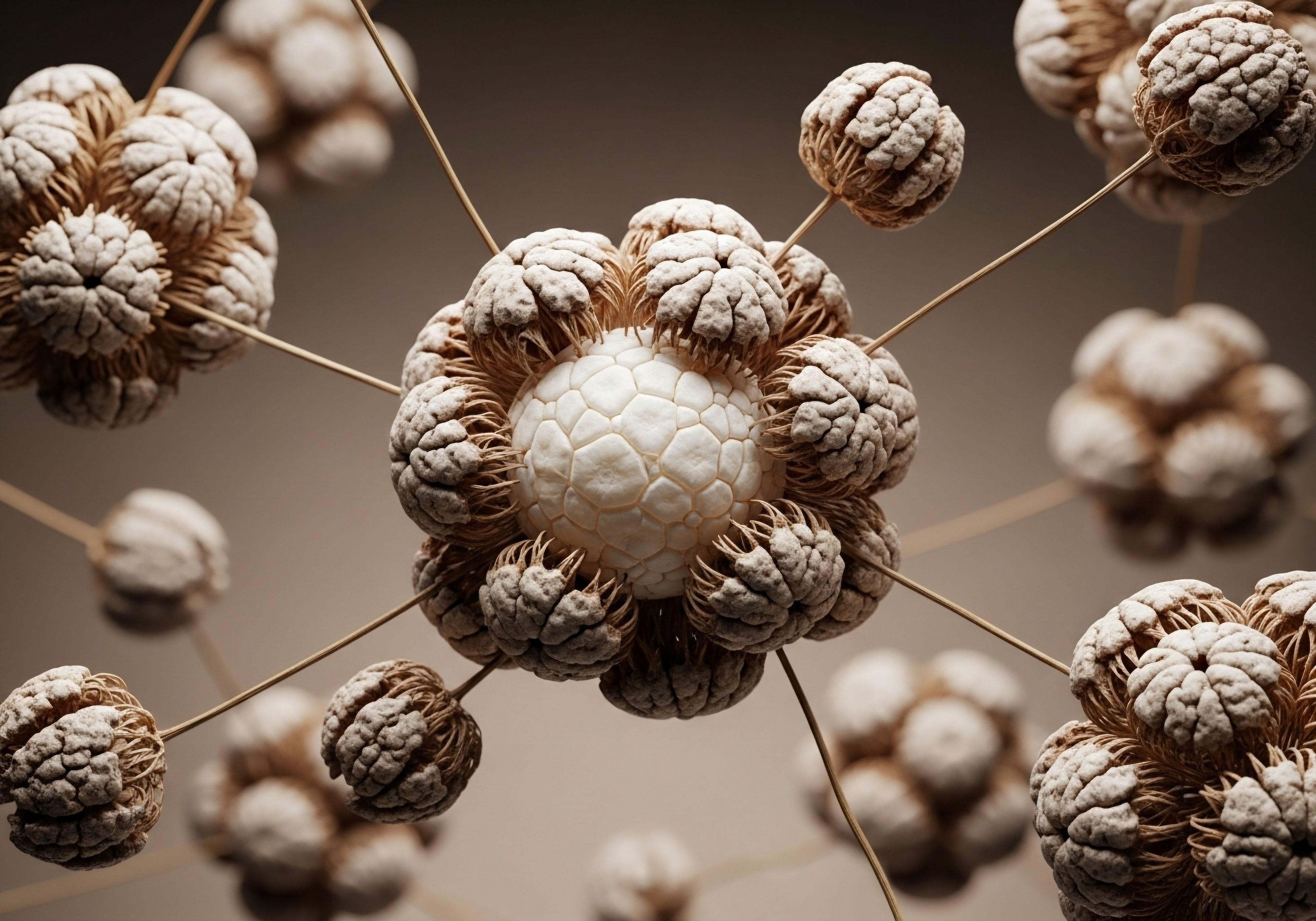

Fundamentals
Many individuals grappling with persistent fatigue, unexplained weight shifts, and a pervasive sense of disquiet often discover the underlying influence of their thyroid gland. The symptoms of autoimmune thyroid conditions, such as Hashimoto’s thyroiditis, frequently extend beyond mere metabolic sluggishness; they permeate one’s entire physiological and emotional landscape.
This often presents as a deep-seated exhaustion, a mental fog that obscures clarity, and a general feeling of systemic imbalance that resists conventional explanations. Understanding this experience forms the bedrock of a path toward reclaiming vitality.
Autoimmune thyroid disease, primarily exemplified by Hashimoto’s thyroiditis, arises when the body’s immune system mistakenly targets the thyroid gland. This process leads to chronic inflammation and a gradual reduction in the gland’s capacity to produce essential thyroid hormones.
These hormones, principally thyroxine (T4) and triiodothyronine (T3), serve as the body’s primary metabolic regulators, orchestrating everything from energy production to cognitive function and mood stability. A disruption in this delicate endocrine balance creates far-reaching systemic consequences, impacting virtually every cell and organ. Immune cells, in particular, possess receptor sites for thyroid hormones, indicating their reliance on proper thyroid function for appropriate maturation and regulation.
Reclaiming personal vitality often begins with recognizing the profound systemic impact of autoimmune thyroid dysfunction.
The body’s endocrine system functions as a complex network of interconnected glands and hormones, operating much like an intricate communication system. Each hormone acts as a messenger, influencing distant cells and tissues, while simultaneously receiving feedback that modulates its own production. This sophisticated feedback loop ensures optimal systemic function.
When autoimmune processes compromise the thyroid, the resulting hormonal imbalance can ripple through this entire network, affecting other endocrine glands and their respective hormone production. This intricate interplay between the immune system and the endocrine system represents a crucial area for understanding overall well-being.

The Thyroid Gland a Central Regulator
The thyroid gland, a small, butterfly-shaped organ located at the base of the neck, produces hormones critical for metabolism, heart rate, and energy regulation. Its proper function is indispensable for maintaining physiological equilibrium. When the immune system launches an attack against thyroid cells, as observed in Hashimoto’s thyroiditis, the gland’s ability to synthesize and release these vital hormones diminishes over time.
This leads to a state of hypothyroidism, where the body operates at a reduced metabolic pace, manifesting a constellation of symptoms that can significantly diminish quality of life.

Understanding Autoimmunity
Autoimmunity represents a fundamental misdirection of the immune system. Instead of identifying and neutralizing external threats, immune cells begin to recognize the body’s own tissues as foreign invaders. In the context of autoimmune thyroid disease, specific antibodies, such as thyroid peroxidase antibodies (TPOAb) and thyroglobulin antibodies (TgAb), emerge, targeting the thyroid gland’s essential components.
These antibodies, alongside activated T-cells, drive the inflammatory damage that characterizes the condition. Genetic predispositions, environmental factors, and hormonal shifts collectively contribute to the genesis of autoimmune conditions.


Intermediate
For individuals already familiar with the foundational principles of autoimmune thyroid disease, the natural progression involves exploring specific clinical protocols designed to restore systemic balance. Personalized hormone protocols extend beyond mere thyroid hormone replacement, aiming to recalibrate the broader endocrine environment that influences autoimmune activity. This approach recognizes that the thyroid gland does not operate in isolation; its function is intricately linked with sex hormones, adrenal hormones, and growth hormone, all of which exert immunomodulatory effects.
The interconnectedness of the endocrine system means that imbalances in one hormonal pathway can exacerbate or even instigate dysregulation in another. For example, sex hormones significantly influence immune responses, with variations in estrogen, progesterone, and testosterone levels playing roles in the prevalence and progression of autoimmune conditions.
Precise hormonal optimization protocols, therefore, aim to address these broader systemic influences, supporting the body’s innate capacity for self-regulation and immune tolerance. This proactive strategy focuses on creating a biochemical environment conducive to reduced autoimmune activity and enhanced overall well-being.
Hormonal optimization protocols target the entire endocrine system, recognizing its profound influence on immune function.

Hormonal Interplay and Autoimmune Thyroid Effects
Sex hormones wield considerable influence over immune system function. Estrogen, for instance, can enhance certain immune responses, potentially contributing to the higher prevalence of autoimmune diseases in women. Progesterone, conversely, generally exhibits anti-inflammatory and immunomodulatory properties, influencing T-regulatory cell induction and dampening pro-inflammatory pathways.
Testosterone also demonstrates a protective effect against thyroid autoimmunity, particularly in men with low levels of this hormone. Addressing these hormonal dynamics through targeted interventions can thus impact the trajectory of autoimmune thyroid conditions.
Personalized hormone protocols often involve carefully titrating bioidentical hormones to physiological levels, supporting the body’s natural endocrine rhythm. These protocols consider the individual’s unique hormonal profile, symptoms, and specific autoimmune markers. The objective is to achieve a state of hormonal equilibrium that promotes immune system balance and reduces inflammatory burdens on the thyroid gland.

Tailored Hormone Protocols for Systemic Balance
The application of specific hormonal optimization protocols depends heavily on an individual’s unique presentation. For men experiencing symptoms of low testosterone alongside autoimmune thyroid issues, Testosterone Replacement Therapy (TRT) may be a considered intervention. This often involves weekly intramuscular injections of Testosterone Cypionate, sometimes complemented by Gonadorelin to support natural testosterone production and fertility, and Anastrozole to manage estrogen conversion. Research suggests exogenous testosterone can reduce thyroid peroxidase and thyroglobulin antibodies, indicating a protective effect on thyroid autoimmunity.
For women navigating hormonal shifts, particularly during perimenopause or post-menopause, personalized protocols might involve subcutaneous injections of Testosterone Cypionate at low doses, alongside tailored Progesterone therapy. Progesterone is prescribed based on menopausal status and its known immunomodulatory effects. Pellet therapy offers a long-acting option for testosterone delivery, with Anastrozole considered when estrogen modulation is appropriate. These interventions aim to restore sex hormone balance, which can indirectly support immune regulation and mitigate autoimmune exacerbations.
Beyond traditional hormone replacement, Growth Hormone Peptide Therapy presents an innovative avenue for supporting overall systemic health, including aspects relevant to autoimmune conditions. Peptides like Sermorelin, Ipamorelin, and CJC-1295 stimulate the natural release of growth hormone, which plays a role in tissue repair, immune cell recovery, and inflammation reduction. These compounds work by signaling the body to enhance its intrinsic healing and regenerative processes, which can be particularly beneficial when dealing with chronic inflammatory states associated with autoimmune thyroid disease.
Consider the potential benefits of targeted peptide therapies:
- BPC-157 ∞ Known for its regenerative and anti-inflammatory properties, this peptide supports gut health and tissue repair, which is often compromised in autoimmune conditions.
- Thymosin Alpha-1 (Tα1) ∞ This peptide aids in regulating T-cell activity and promoting immune tolerance, thereby lessening immune attacks on healthy tissues, including the thyroid gland.
- Ipamorelin / CJC-1295 ∞ These peptides stimulate growth hormone release, contributing to enhanced fat loss, improved muscle recovery, and increased energy levels, all of which indirectly support metabolic and immune function.
These protocols represent a departure from a singular focus on thyroid hormone levels, instead embracing a comprehensive strategy that addresses the multifaceted hormonal and immunological drivers of autoimmune thyroid disease. The goal involves optimizing the entire endocrine symphony to foster greater resilience and function.
| Hormone/Peptide | Primary Action | Immunomodulatory Effect |
|---|---|---|
| Testosterone | Androgenic, anabolic | Reduces pro-inflammatory cytokines, supports immune balance, protective against thyroid autoimmunity. |
| Progesterone | Reproductive, neurosteroid | Anti-inflammatory, induces T-regulatory cells, dampens Th1/Th17 pathways. |
| Sermorelin/Ipamorelin/CJC-1295 | Growth hormone secretagogue | Supports tissue repair, immune cell recovery, reduces inflammation. |
| BPC-157 | Systemic healing, gut repair | Anti-inflammatory, promotes gut integrity (key for immune homeostasis). |


Academic
A deeper academic exploration of autoimmune thyroid effects necessitates an intricate understanding of endocrine-immune crosstalk at the molecular and cellular levels. The proposition that personalized hormone protocols can mitigate these effects finds its basis in the complex bidirectional signaling between the neuroendocrine and immune systems. This involves not only the direct action of hormones on immune cells but also the reciprocal influence of immune mediators on hormone synthesis and receptor sensitivity.
The immune system, highly receptive to endocrine signals, modulates its activity based on the hormonal milieu. Conversely, immune cells themselves produce hormones and cytokines that can significantly alter endocrine function. This dynamic interplay underscores the systemic nature of autoimmune thyroid conditions, moving beyond a simple thyroid pathology to a broader disruption of homeostatic mechanisms. Understanding these granular interactions is paramount for developing truly effective personalized protocols that restore physiological equilibrium.
The intricate molecular dialogue between hormones and immune cells forms the scientific basis for personalized interventions in autoimmune thyroid conditions.

Molecular Mechanisms of Endocrine-Immune Crosstalk
Autoimmune thyroid diseases (AITD) are fundamentally T-cell-mediated disorders where a dysregulated immune response targets thyroid antigens. This aberrant interaction involves abnormal thyrocytes, antigen-presenting cells, and T cells. Hormonal factors significantly influence this immune landscape. For example, sex steroids possess specific receptors on various immune cells, including T and B lymphocytes, macrophages, and dendritic cells. The differential expression and activation of these receptors by circulating hormones can shift immune responses towards either pro-inflammatory or anti-inflammatory phenotypes.
Estrogen, particularly estradiol, has been linked to elevated B-cell activating factor (BAFF) levels, contributing to the pathogenesis of AITD. This occurs through estrogen’s influence on BAFF protein transcription, potentially dysregulating thyroid function. Testosterone, in contrast, demonstrates an immunosuppressive effect, reducing pro-inflammatory cytokines and influencing T-cell production and function to promote immune balance. Studies indicate that testosterone can reduce titres of thyroid peroxidase and thyroglobulin antibodies, offering a protective mechanism in autoimmune thyroiditis.
Progesterone’s immunomodulatory actions involve the suppression of pro-inflammatory Th1 and Th17 differentiation, alongside the induction and expansion of T-regulatory (T-reg) cells. T-regs are crucial for maintaining immune tolerance and preventing autoimmune attacks. High doses of progesterone, akin to pregnancy levels, can suppress toll-like receptor 9-induced interferon-alpha production, which helps mitigate Th1-driven autoimmunity. This suggests a dose-dependent effect on immune pathways.

Peptide Therapeutics and Immunomodulation
Peptide therapy represents a sophisticated approach to modulate immune responses without causing broad immunosuppression. These short chains of amino acids function as signaling molecules, interacting with specific receptors to initiate or inhibit cellular processes. In the context of autoimmune thyroid conditions, peptides offer targeted mechanisms to restore immune tolerance and support tissue integrity.
The thymus gland, a central organ for T-cell maturation, is influenced by peptides such as Thymosin Alpha-1 (Tα1), which enhances T-cell activity and promotes immune tolerance.
Other peptides, such as BPC-157, exert their therapeutic effects through systemic healing and anti-inflammatory properties. BPC-157 promotes cellular repair, angiogenesis, and gut health restoration, which is critical for immune homeostasis. A compromised gut barrier, often termed “leaky gut,” is frequently implicated in the initiation and perpetuation of autoimmune responses. By healing the gut lining, BPC-157 can reduce the antigenic load on the immune system, thereby attenuating autoimmune flares.
Growth hormone-releasing peptides, including Ipamorelin and CJC-1295, stimulate the pituitary gland to release growth hormone. Growth hormone itself influences immune cell proliferation and function, contributing to tissue repair and recovery. The precise mechanisms involve complex signaling pathways that impact cytokine production, cellular regeneration, and metabolic regulation, all of which are pertinent to mitigating autoimmune processes. The aim is to restore the body’s endogenous regenerative capacity, which diminishes with age and chronic illness.
Consider the cellular impact of these targeted interventions:
- Hormone Receptors on Immune Cells ∞ Sex steroids bind to specific receptors on immune cells, directly influencing gene expression and cytokine profiles. Androgens, for instance, often downregulate pro-inflammatory cytokines, while estrogens can sometimes upregulate them, depending on the context and receptor subtype.
- Cytokine Balance Modulation ∞ Personalized hormone protocols and peptide therapies can shift the balance of T helper (Th) cell responses. For example, promoting a Th2 or T-reg dominant response over a Th1 or Th17 response helps reduce the destructive inflammatory processes characteristic of autoimmune thyroiditis.
- Tissue Repair and Regeneration ∞ Peptides like BPC-157 directly stimulate tissue repair mechanisms, which can help in restoring the integrity of the thyroid gland itself or associated tissues affected by chronic inflammation. This regenerative capacity is crucial for long-term functional improvement.
The precision medicine approach in autoimmune thyroiditis involves a careful assessment of an individual’s unique hormonal and immune profile, guiding the selection of specific hormone and peptide therapies. This bespoke strategy recognizes the profound interconnectedness of physiological systems, offering a pathway to not only manage symptoms but also to address the underlying immunological dysregulation that drives autoimmune conditions.
| Peptide | Primary Mechanism | Relevance to Autoimmune Thyroid |
|---|---|---|
| Thymosin Alpha-1 (Tα1) | Regulates T-cell activity, promotes immune tolerance, enhances T-cell maturation | Reduces autoimmune attacks on thyroid, balances immune response. |
| BPC-157 | Promotes tissue repair, reduces inflammation, heals gut lining | Mitigates systemic inflammation, improves gut-immune axis, supports thyroid tissue integrity. |
| Ipamorelin/CJC-1295 | Stimulates endogenous growth hormone release | Enhances cellular regeneration, supports immune cell recovery, indirectly reduces inflammation. |

References
- Ahmed, S. A. & Penhale, W. J. (1982). The influence of testosterone on the development of autoimmune thyroiditis in thymectomized and irradiated rats. Clinical and Experimental Immunology, 48(2), 367 ∞ 374.
- G. D. D. J. F. L. E. A. S. E. (2020). Sex hormone influence on female-biased autoimmune diseases hints at puberty as an important factor in pathogenesis. Frontiers in Immunology, 11.
- M. R. (2021). Thyroid Autoimmune Disease ∞ Impact on Sexual Function in Young Women. Journal of Clinical Medicine, 10(3), 481.
- P. P. (2021). Effects of hyperthyroidism, hypothyroidism and thyroid autoimmunity on female sexual function. Sex Medicine, 9(1), 100345.
- R. S. (2020). Precision Medicine in Autoimmune Thyroiditis and Hypothyroidism. Frontiers in Endocrinology, 11.
- S. A. (2012). Modulation of autoimmunity with artificial peptides. Journal of Autoimmunity, 39(1-2), 101 ∞ 108.
- S. P. (2021). Thyroid function, sex hormones and sexual function ∞ a Mendelian randomization study. Journal of Clinical Endocrinology & Metabolism, 106(4), e1577 ∞ e1588.
- Savino, W. & Guaraldi, F. (Eds.). (2017). Endocrine Immunology. Karger Publishers.

Reflection
The journey to understand one’s own biological systems often begins with a recognition of subtle, yet persistent, disruptions to well-being. This exploration into personalized hormone protocols and their potential role in mitigating autoimmune thyroid effects stands as a testament to the body’s profound interconnectedness.
The insights gained here serve as a guide, illuminating the intricate dialogue between hormones and the immune system. True reclamation of vitality demands a personalized approach, one that honors your unique biological blueprint and acknowledges the nuanced interplay of your internal environment. Consider this knowledge a powerful starting point, a call to proactive engagement with your health narrative, leading you towards a future of uncompromised function and enduring well-being.



